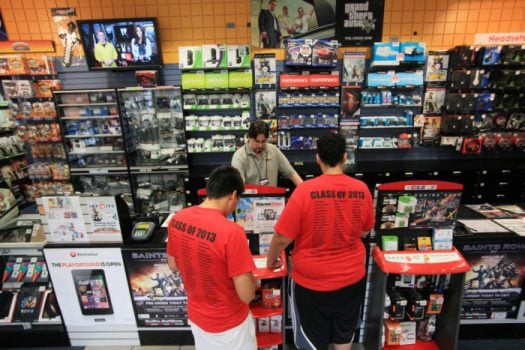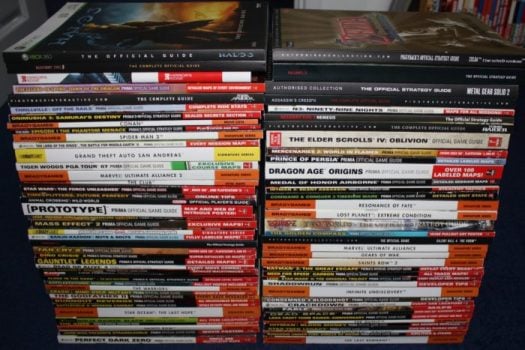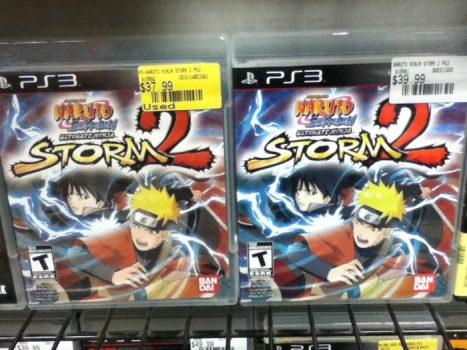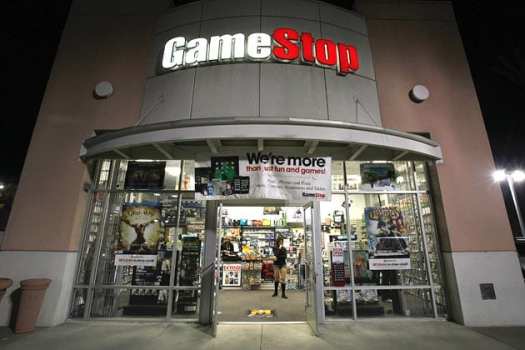Incredibly Aggressive Guerilla Sales Tactics

All of these entries are based on past experience as a Gamestop employee.
Just about everyone who’s shopped at GameStop for a period of time in their life will have a GameStop story. More often than not, these stories tend to include situations wherein customers are forced to deal employees who will either continuously badger them on the sales floor or go through a 5 minute (and often longer) sales pitch at the register about game pre-orders, the GameStop PRO card, or some other thing that you probably didn’t walk in the store with any intention of getting.
Now it would be one thing if these long-winded monologues pertained to things we’d be interested in, but they also eat up something far more valuable than our attention and that’s our time. It can be incredibly draining to politely decline four or five times over just to be able to purchase the single game you’ve been dying to play. It’s irritating, it’s aggravating, and honestly, it can make or break an entire experience when shopping at GameStop, a place that by most measures should be a fun, exciting hobby store to visit. But please don’t run off and blame the employees, it’s their job that they have to do. And coming from personal experience, they don’t want to waste your time any more than you want them to.
“Trade-in Deals”

GameStop’s trade-in policies and prices have been subject of ridicule for an exceedingly long time. However, what isn’t often touched on is just how unfair and ridiculous their random trade-in deals can be. These trade in deals often come in the form of trading in a game to cut the cost of it’s sequel or trading in a specific number of games to get a large bonus to the final amount. What they don’t tell you is how the company accounts for the cost loss on their end.
In order to prevent major loss on their end, GameStop likes to play with the trade-in numbers. Essentially, when a “deal” is about to hit, the company will go through all or most of the games that are applicable to the deal and will slash their trade-in amounts. This effectively lessens the impact of the “deal” and while the customer will generally benefit higher than just trading the games in during a standard time, the gain is quite minimal. Meanwhile, the customers are happy to be scoring a “deal” and GameStop looks like the good guy. So be careful when trading in that handheld the next time Nintendo announces a new 3DS model.
Destruction of “Pennied Out” Items

When GameStop carries an item for a very long time, past the point where it would generally sell, they do what’s called “penning it out.” What this means is that the cost of the item is set to $.01 and it is permanently removed from the company’s system. These items often come in the form of strategy guides, minor toys, or other small miscellaneous items. You’re probably wondering what GameStop does with these items. Well, it definitely isn’t what they should.
Instead of opting to create a small bin of almost free items or even donating them out, the company instead instructs the employees to gather the items together and take them out to the trash to be discarded and destroyed. It is against company policy to do anything else with these items. The employees can’t take them (though some do), they cannot be given out, nor can they even be sold. It’s a practice that legitimately makes no sense and just serves to be a complete waste of time and resources.
Employee New Game Demo Rentals Resold As New

It might not be anything new to learn that one perk employees have for working at GameStop is the ability to rent out games for a small period of time in order to demo them. A major part of this perk is that it also includes renting out brand new, sometimes sealed, games. What is messed up about this practice is that these already played games are then resold as new games when the employee returns them.
In your time shopping at GameStop, you have probably either seen or purchased a brand new game that needed to have its case taken off the wall and filled with a disc stored behind the counter in a white sleeve. These copies are referred to as “gut copies.” If you are buying a “gut copy,” then it’s best to have caution, as that game may or may not have already been played by an employee. It’s company policy to try and rent out the “gut copy” of new games instead of taking home a fully sealed one, however the ladder does certainly happen from time to time. While it’s a nice benefit for the employees to have, it really isn’t fair to claim to be selling something that you actually aren’t. And as much as GameStop loves selling used items, no customer wants to buy a used “new” game.
Criminally Unfair to Employees

It’s very easy to get mad at GameStop employees, especially when they give you long spiels and have already played your copy of the “new” game you just bought. But there is something very important to keep in mind, GameStop treats its employees like dirt. In fact just last year, GameStop was named the 10th worst company to work for by 24/7 Wallstreet, a financial analysis and commentary website. Part-time employees are more often than not only given 6-12 hours of work a week (12 if they are lucky), while full-time employees struggle to receive even 32 of the 40 hours they are normally promised. On top of that, the company does very little to reward good salesmanship or high numbers outside of the ability to keep one’s job.
Employees who don’t give the incredibly long register sales pitch or who don’t aggressively interact with customers on the sales floor are often reprimanded and in many cases, given less hours than the sea of other part-time employees each GameStop has at the ready (as GameStop prefers quantity over quality for their employees). It really shouldn’t be any surprise that employees may come off lackadaisical or that they take advantage of every perk they’re given, especially because their pay is about as low as it could possibly get. So the next time you think that working for GameStop is a dream come true, you may want to take a closer look into the reality.
